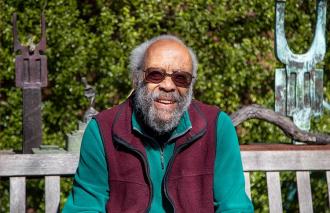William Russell Ellis’ songwriting career had an unlikely start. After reading an article about a writer cleaning houses to get by, Ellis decided to greet his family’s housekeeper every day by singing her name — a habit that turned into a song, aptly named “Eliza.”
“I said to myself, ‘Russell Ellis, you are just one generation away from slavery. You have the right to invisibilize no one,’ ” Ellis said. “And then, for the rest of the year, songs keep coming up.”
Since then, Ellis has recruited his children to help him produce his music with Berkeley Cat Records, including a track, “Oom Chugga,” about motivating young people to vote.
Before he was passionate about singing, however, Ellis played many different roles in his life: track star, scholar, professor, artist and mover and shaker, acting as UC Berkeley’s vice chancellor of undergraduate affairs from 1989 to 1995.
After receiving his doctorate at UCLA, Ellis taught sociology at Pitzer College from 1966 to 1969, becoming the first full-time Black professor to work at the Claremont Colleges. Despite having a background in social science, Ellis came to UC Berkeley in 1970 to teach at the campus’ College of Environmental Design, or CED.
“I knew nothing about architecture, and I still don’t, but Berkeley was genuinely committed to the idea of someone coming to talk about social issues in architecture,” Ellis said. “My angle was to teach them how to observe people, how to see what their interchanges were, how they lived.”
Wanting to capture the lives of Black faculty who, such as himself, had to take on many different roles outside of their duties as professors to help the university serve underrepresented students during a period of social change, Ellis helped organize an archival project.
The project, titled “African American Faculty and Senior Staff Oral History Project,” records the stories of the first Black faculty members who received tenure at UC Berkeley and includes Ellis’ oral history.
“It wasn’t easy to do,” Ellis said. “If you’re a minority, you couldn’t just go home and do your research, you’re also expected to advocate for Black people and do things to help other minorities in the world.”
Ellis added that he became a resource for Black students adjusting to UC Berkeley as assistant dean of the CED.
Born in Los Angeles in 1935, Ellis ran track at Compton High School and attended UCLA on an athletic scholarship. As a student, Ellis found it difficult to switch between the Black slang used at home and the academic language used in the classrooms of UCLA, an experience he used to help Black students adjust to the expectations of the university.
“I came back to Compton, and I couldn’t keep up with the slang,” Ellis said. “My real job was to learn the content and talk of the university.”
Ellis noted that having this experience to draw from helped him serve Black students, whom he said were not likely to become “code-switchers” in university.
Over the course of his time on campus, Ellis was pulled away from his department and recruited by the administration to help work on affirmative action, first as a faculty assistant for the faculty affirmative action office and then eventually as vice chancellor of undergraduate affairs.
He described himself as a natural delegator and proactive decision-maker with an instinct for organizational work.
“People have simple-minded ideas about how organizations work; they always want to blame somebody,” Ellis said. “I had the advantage of my sociology background, and I didn’t make the mistake of always finding someone to blame.”
In each of his roles on campus, Ellis was a leader in increasing campus diversity, engaged in recruiting underrepresented students and hiring more Black and Latinx faculty and women. In 1995, however, the UC Board of Regents voted to end affirmative action within the university, limiting the methods through which the university could increase diversity among students and faculty.
While Ellis said he does not imagine affirmative action returning to California, he is confident that academia will continue to become more diverse by the merit of scholars of color coming into the workforce.
“Now, we have a lot more people and women of color in the pipeline who are relevant to the positions at Cal,” Ellis said. “I think the culture of management at the university has shifted in the direction of supporting more diversity.”
Citing UC Berkeley’s commitment to inclusion, from championing LGBTQ+ rights on campus to supporting cross-disciplinary studies, Ellis said, “I think it’s opening up, and I think it will stay opening up.”
Contact Ruby Sutton at rubysutton@dailycal.org and follow her on Twitter at @rubysutton
